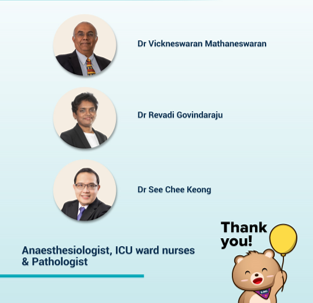Cataract Wasn’t the Cause for Her Blurred Vision — It Was a Tumour
When Madam Soh’s vision remained blurry despite cataract surgery, she felt something wasn’t quite right. What she didn’t expect was that the true issue wasn’t in her eyes — it was in her brain.

An MRI scan of Madam Soh's brain showed the tumour pressing on her optic nerve.
The Unexpected Cause Behind Madam Soh’s Blurred Vision
In October 2024, Madam Soh Mee Hong underwent cataract removal surgery at an eye specialist centre in Malacca. While her right eye’s vision was restored, her left eye’s vision remained slightly blurry.
Concerned that something else might be at play, the eye specialist recommended a brain MRI scan at a nearby hospital in Malacca to identify the underlying cause.
The results revealed an unexpected diagnosis: Madam Soh had a tumour located in her pituitary gland, a small structure at the base of the brain, behind the nose.
“I was shocked and felt quite anxious,” Madam Soh recalls. “It was difficult to process such news, especially when I wasn’t expecting anything like this.”
Following this, the eye specialist referred Madam Soh to a neurosurgeon for further assessment.
Finding the Right Doctor and Treatment Plan

Dr Vickneswaran Mathaneswaran, Consultant Neurosurgeon at SJMC
The local neurosurgeon Madam Soh consulted didn’t provide the reassurance she was looking for to proceed with surgery. Feeling uncertain, she returned to her hometown in Muar and sought guidance from her family doctor.
“He suggested I wait and observe any changes in my daily life before deciding on surgery. However, after a few months, I wasn’t feeling any better, and I continued to experience health issues. So, I went back to my family doctor, who then recommended I seek treatment in the Klang Valley.”
When Madam Soh met Dr Vickneswaran Mathaneswaran, Consultant Neurosurgeon at SJMC, she found the clarity and confidence she needed. “My specialisation is in endoscopic pituitary tumours, and after reviewing her scans, I knew surgery was the right course of action,” Dr Vickneswaran explained.
Pituitary adenomas are noncancerous tumours that occur in the pituitary gland. Although most are slow-growing and benign, they can interfere with vital hormone functions and put pressure on the optic nerves, leading to vision issues.
Dr Vickneswaran referred Madam Soh to Dr See Chee Keong, Consultant Endocrinologist to assess her hormone levels, and it was confirmed that her levels were lower than normal.
Although Madam Soh speaks little to no English, she felt a sense of trust and reassurance with Dr Vickneswaran. His calm, professional demeanour and extensive experience in treating similar cases gave her the confidence she needed to proceed with surgery.
A Collaborative Approach for a Successful Recovery
Madam Soh’s surgery was a team effort. Dr Vickneswaran was supported by Dr Revadi Govindaraju, Consultant ENT Surgeon, to ensure the procedure went smoothly. “While the neurosurgeon focuses on removing the tumour through the nasal passages, I assist by ensuring clear access via the nasal cavity, and finally repair the skull base defect, both of which are critical steps in the surgery,” Dr Revadi explained.
Post-surgery, follow-up care with an ENT surgeon is essential. Dr Revadi added, “Washing the nose is a key step in the healing process coupled with frequent nose debridement done in the clinic. This helps clear any residual blood or mucus that may have accumulated, which in turn ensures optimal healing and recovery.”
Besides the ENT Surgeon, the Endocrinologist also continues to monitor Madam Soh’s pituitary hormone levels. “The right post-care is something we shouldn’t underestimate as the pituitary gland makes important hormones that control the production of cortisol (to manage stress), thyroid hormones (to manage energy & metabolism), and even regulates how much we urinate. These hormones are key to survival and need to be monitored closely so Madam Soh can be treated if the levels drop,” Dr See Chee Keong added.
During her follow-up visit a month later, Madam Soh’s MRI scans confirmed that the operated area was clear and healing well.

Looking back on her treatment journey, Madam Soh expressed heartfelt gratitude for the support she received. She credits the expertise and collaboration of SJMC’s Multidisciplinary Team (MDT) consisting of Neurosurgeon, ENT Surgeon, Endocrinologist, specialised Anaesthesiologist for such complex procedures, ICU ward for post surgery care and pathologist for her positive outcome and recovery.
“I’m incredibly thankful for the care I received. Thanks to them, I’m now able to look forward to life with renewed confidence and health.”
__________
Want to know more about SJMC's services? Contact TeleConnect, our concierge for 24-Hour Medical Enquiries: +603 - 5639 1818.





